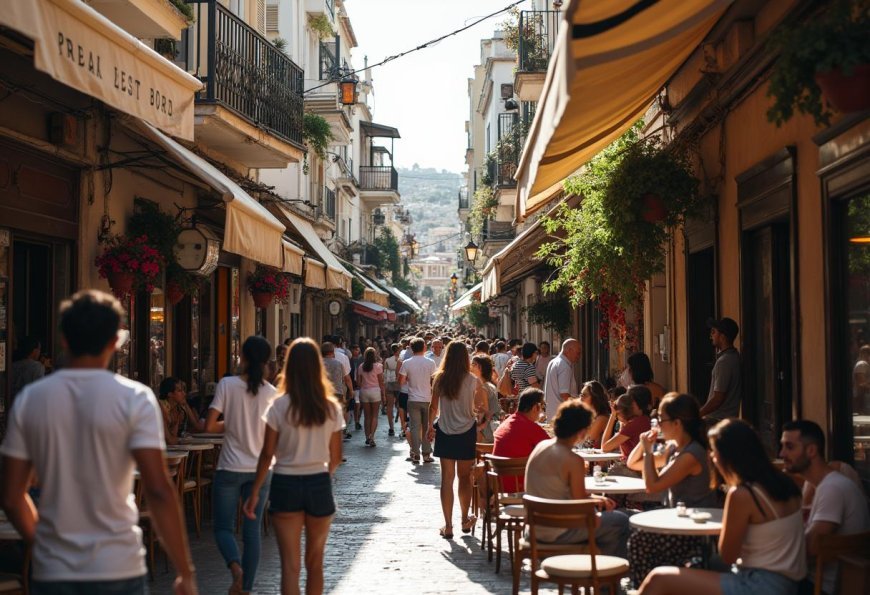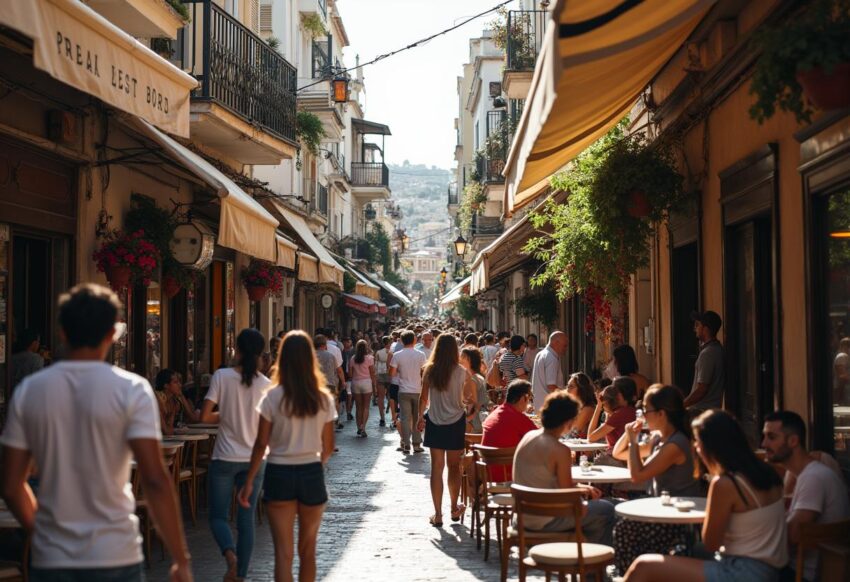Plaka District In Athens Struggles With Overtourism And Rising Living Costs


The ancient city of Athens has long attracted travelers interested in its rich heritage. However, the recent surge in tourism has led to some unintended consequences, especially in the historic Plaka district. Here, locals are voicing concerns about the effects of overtourism. Athens expects a record-breaking 10 million visitors this year, a significant jump from 8 million in 2024. As a result, the charm of Plaka, located beneath the Acropolis, is being overshadowed by the challenges that come with such large visitor numbers.
Giorgos Zafeiriou, a long-time resident of Plaka and leader of the residents’ association, has seen firsthand how tourism has changed his beloved neighborhood. “Plaka is threatened by overtourism,” Zafeiriou said, referring to the bustling streets filled with the sounds of tourists, restaurants, and the constant noise of suitcase wheels navigating crowded spaces. Plaka was once a peaceful area where history and modern life coexisted, but now it faces increased pressures from tourism.
The Tourism Surge and Its Impact on Plaka
In recent years, Athens has become one of Europe’s top destinations for international travelers. Once considered just a stopover for those heading to Greece’s islands, Athens now draws millions hoping to visit historic sites like the Parthenon and the ancient Agora. The surge in travel following the pandemic has only increased this popularity. Consequently, the Plaka district, situated at the foot of the Acropolis, has become a central point for this influx of tourists.
Tourism is important for Greece’s economic recovery, but it has significantly changed Plaka, which is Europe’s oldest continuously inhabited neighborhood. “We cannot see it lose its soul,” said Lydia Carras, head of the Ellet association, which works to protect Plaka’s cultural and environmental heritage. The district is known for its cafes, small Byzantine churches, and Ottoman-era landmarks. Now, its charming streets are often overflowing with tourists, blocking narrow paths and overwhelming local businesses.
Economic Benefits vs. Social Strain
For many residents and shop owners in Athens, tourism presents a mixed blessing. Konstantinos Marinakis, who runs a souvenir shop in Plaka, recognizes the economic benefits of tourism, which has played a key role in Greece’s recovery from the 2008 financial crisis. “Greece is finally doing better thanks to the health of tourism,” he said, noting that the industry has created jobs and boosted local commerce.
However, as tourist numbers grow, so do the costs of living and doing business in the area. Housing prices have shot up, making it harder for locals to afford to live in their neighborhood. The rise in short-term rentals, particularly through platforms like Airbnb, has worsened this problem. The increase in seasonal rentals has led to soaring rents, forcing many longtime residents to leave.
Local Backlash and Measures for Change
The backlash against overtourism in Plaka is part of a broader trend seen in popular European destinations like Barcelona and Venice, where locals have expressed frustration with mass tourism’s negative effects. In Athens, residents are concerned about rising rents and commercialization in their historic neighborhood. Mayor Haris Doukas has acknowledged these problems, admitting that areas like Plaka are “saturated with tourists.” While the city takes pride in being a top tourist destination, there is growing awareness that action is necessary to manage the situation before it spirals out of control.
To tackle these issues, the city has initiated measures to regulate tourism in Plaka. An intervention unit has been created to enforce local rules and ensure that businesses do not take over public spaces. This unit is backed by police and allows residents to report violations, such as encroachment on pedestrian areas or illegal parking.
The city has also struggled to enforce laws on short-term rentals. Dimitris Melissas, a lawyer for the Ellet association, has taken action against buildings converted into multiple rental units, arguing that they operate as hotels without proper oversight. This case, currently under review by Greece’s highest administrative court, could set an important legal precedent for regulating short-term rentals in Athens.
Future of Plaka and Athens
Athens stands at a pivotal point. While the city continues to gain from tourism, it is increasingly difficult to balance growth with preservation. The future of the Plaka district, with its long history, is uncertain. City officials and residents alike face the challenge of protecting the area’s character while welcoming millions of visitors each year.
For the time being, residents of Plaka remain committed to preserving the area’s essence. Efforts to regulate tourism, manage short-term rentals, and maintain public spaces are positive steps. However, with the influx of visitors showing no sign of slowing down, Athens will need long-term solutions to ensure its cultural and historical treasures remain intact for future generations.
Conclusion
The tourism boom in Athens, particularly in the historic Plaka district, has sparked a complex debate about balancing economic growth and preservation. While tourism provides vital revenue for the city, it also brings challenges that must be resolved to maintain the character of one of Europe’s oldest neighborhoods. Through thoughtful planning and regulation, Athens can keep welcoming visitors while safeguarding its cultural heritage, allowing both locals and tourists to enjoy this historic city for years to come.
(Source: Athens City Government, Plaka Residents’ Association, Lydia Carras, Dimitris Melissas)
The post Plaka District In Athens Struggles With Overtourism And Rising Living Costs appeared first on Travel And Tour World.






